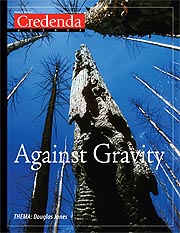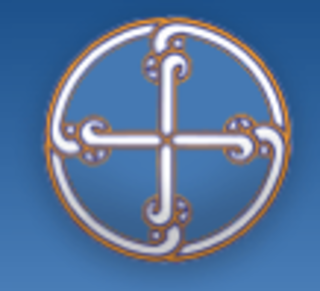
HarperCollins Publishers LLC is a British-American publishing company that is considered to be one of the "Big Five" English-language publishers, along with Penguin Random House, Hachette, Macmillan, and Simon & Schuster. HarperCollins is headquartered in New York City and London and is a subsidiary of News Corp.

The MIT Press is the university press of the Massachusetts Institute of Technology (MIT), a private research university in Cambridge, Massachusetts. The MIT Press publishes a number of academic journals and has been a pioneer in the Open Access movement in academic publishing.

In Christian tradition, the Four Evangelists are Matthew, Mark, Luke, and John, the authors attributed with the creation of the four canonical Gospel accounts. In the New Testament, they bear the following titles: the Gospel of Matthew; the Gospel of Mark; the Gospel of Luke; and the Gospel of John.
Charles Caldwell Ryrie was an American Bible scholar and Christian theologian. He served as professor of systematic theology and dean of doctoral studies at Dallas Theological Seminary and as president and professor at what is now Cairn University. After his retirement from Dallas Theological Seminary he also taught courses for Tyndale Theological Seminary. He is considered one of the most influential American theologians of the 20th century. He was the editor of The Ryrie Study Bible by Moody Publishers, containing more than 10,000 of Ryrie's explanatory notes. First published in 1978, it has sold more than 2 million copies. He was a notable proponent of classic dispensationalism.

Credenda/Agenda was a Christian cultural and theological journal, published under the auspices of Christ Church of Moscow, Idaho. Douglas Wilson served as editor, Douglas Jones as senior editor, and N. D. Wilson as managing editor. Editions were published quarterly in print form and also electronically on the internet. Canon Press, another ministry of Christ Church, also produced an audio edition.

Simon & Schuster LLC is an American publishing company owned by Kohlberg Kravis Roberts. It was founded in New York City on January 2, 1924, by Richard L. Simon and M. Lincoln Schuster. Along with Penguin Random House, Hachette, HarperCollins and Macmillan Publishers, Simon & Schuster is considered one of the 'Big Five' English language publishers. As of 2017, Simon & Schuster was the third largest publisher in the United States, publishing 2,000 titles annually under 35 different imprints.
WND is an American far-right news and opinion website. It is known for promoting fake news and conspiracy theories, including the false claim that former President Barack Obama was born outside the United States.
Zondervan is an international Christian media and publishing company located in Grand Rapids, Michigan, United States. Zondervan is a founding member of the Evangelical Christian Publishers Association (ECPA). It is a part of HarperCollins Christian Publishing, Inc. and has multiple imprints including Zondervan Academic, Zonderkidz, Blink, and Editorial Vida. Zondervan is the commercial rights holder for the New International Version (NIV) Bible in North America. According to the Zondervan website, it is the largest Christian publisher.
Christian novels are a genre of novels in the tradition of Christian literature, written as a work of fiction focusing on religious events and worldviews.

New Saint Andrews College is a private classical Christian college in Moscow, Idaho. It was founded in 1994 by Christ Church. The college offers no undergraduate majors, but follows a single, integrated classical liberal arts curriculum from a Christian worldview in its associate's and bachelor's degree programs. The college also offers master's degrees in theology and letters and classical Christian studies. The New Saint Andrews board, faculty, and staff are confessionally Reformed (Calvinist). Board members are affiliated with the Communion of Reformed Evangelical Churches (CREC). The Elders of nearby Christ Church serve as the college's spiritual authority.

Christ Church is a Calvinist church in Moscow, Idaho, pastored by Douglas Wilson, and a member of the Communion of Reformed Evangelical Churches. The congregation has received international coverage for its views, which include advocating for a theocracy, and its desire to make Moscow a "Christian town". It has formal and informal affiliations with a number of ministries, including a three-year ministerial training program, a private accredited college, a campus ministry, and formerly a publishing operation and magazine. The church is estimated to have between 900 and 2,000 members.

Douglas James Wilson is a conservative Reformed and evangelical theologian, pastor at Christ Church in Moscow, Idaho, faculty member at New Saint Andrews College, and author and speaker. Wilson is known for his writing on classical Christian education, Reformed theology, as well as general cultural commentary. He is a public proponent of postmillenialism, Christian nationalism, and covenant theology. He is also featured in the documentary film Collision documenting his debates with anti-theist Christopher Hitchens on their promotional tour for the book Is Christianity Good for the World?.
Christian nationalism is a form of religious nationalism that focuses on promoting the Christian views of its followers, in order to achieve prominence or dominance in political and social life. According to researchers, Christian nationalist adherents are more likely to trust conspiratorial information sources, show some support for political violence, and promote anti-democratic ideals.
Classical Christian education is a learning approach popularized in the late 20th century that emphasizes biblical teachings and incorporates a teaching model from the classical education movement known as the Trivium, consisting of three parts: grammar, logic, and rhetoric. It is taught internationally in hundreds of schools with about 40,000 students, as of 2024.
The Federal Vision is a Reformed evangelical theological approach that focuses on covenant theology, Trinitarian thinking, the sacraments of baptism and communion, biblical theology and typology, justification, and postmillennialism. A controversy arose in Reformed and Presbyterian circles in response to views expressed at a 2002 conference entitled The Federal Vision: An Examination of Reformed Covenantalism. The ongoing controversy involves several Reformed denominations including the Orthodox Presbyterian Church (OPC), the Presbyterian Church in America (PCA), the United Reformed Churches in North America (URCNA), and the Reformed Presbyterian Church in the United States (RPCUS), and the Protestant Reformed Churches in America (PRCA).

The Communion of Reformed Evangelical Churches (CREC), formerly the Confederation of Reformed Evangelical Churches, was founded in 1998 as a body of churches that hold to Reformed theology. Member churches include those from Presbyterian, Reformed, and Reformed Baptist backgrounds. The CREC has over a hundred member churches in the United States, Canada, Japan, Russia, Hungary, Ukraine, Bulgaria, Belarus, Poland, Brazil, Jersey, and the Czech Republic. These are organised into nine presbyteries, named after figures in church history: Anselm, Athanasius, Augustine, Bucer, Hus, Knox, Kuyper, Tyndale, and Wycliffe.
Nathan David Wilson is an American author of young adult fiction.

Logos School is a private, classical Christian school in Moscow, Idaho. Logos School is one of the first Classical Christian schools in the modern movement. Its teaching approach is discussed in the book Recovering the Lost Tools of Learning. Logos School is organized as a limited liability company.

Kevin Lee DeYoung is an American Reformed theologian, pastor, and author. He is currently the senior pastor at Christ Covenant Church in Matthews, North Carolina. The church he previously pastored, University Reformed Church, moved to the Presbyterian Church in America in March 2015 after having been a member of the Reformed Church in America.

Philip Ian Mounstephen is a British Anglican bishop and missionary. He has been the Bishop of Winchester since 2023, having been Bishop of Truro from November 2018 until 2023. Mounstephen was previously the executive leader of the Church Mission Society (CMS); worked for the Church Pastoral Aid Society (CPAS); and served in parish ministry in the Diocese of Oxford, the Diocese of Southwark and the Diocese in Europe.












